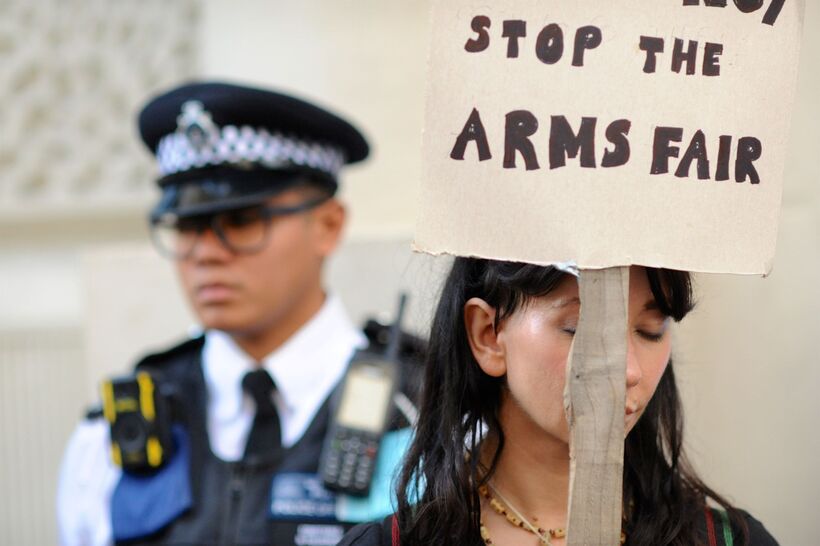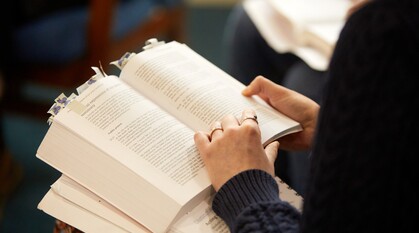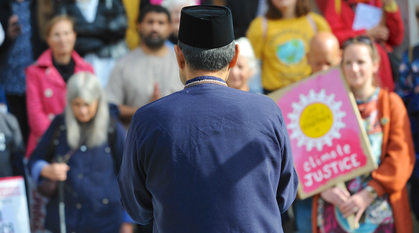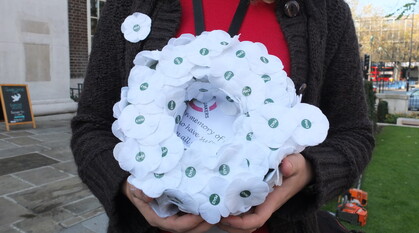Quaker protest amidst new police powers
New police powers mean protestors face much tighter controls. Oliver Robertson and Lyndsay Burtonshaw take a look at the new legislation and explore why Quakers should continue to put faith into action.

For centuries there have been Quakers whose faith has led them to take public actions, even when these are unpopular or illegal. The ability to witness is for many an important expression of Quaker religion.
[QUOTE-START]
Respect the laws of the state but let your first loyalty be to God's purposes. If you feel impelled by strong conviction to break the law, search your conscience deeply. Ask your meeting for the prayerful support which will give you strength as a right way becomes clear.
- Advices & queries 35
[QUOTE-END]
In recent years, the largest mass Quaker protests have been for the environment, such as major Extinction Rebellion gatherings, and for peace. Much Quaker witness against the trade in weapons has focused around the DSEI arms fair in East London, the largest event of its kind in Europe. You can read people's experiences of protesting there, and find out how to get involved when DSEI returns in September 2023.
This year the protests will take place against the backdrop of a slew of new laws explicitly designed to limit peaceful protest. Despite campaigning by Quakers in Britain and many others, measures in the Policing Act 2022 and Public Order Act 2023 mean protestors face much tighter controls.
The impact of new laws
These draconian measures also restrict our freedom to practice our religion. In recent years, the protest against war and weapons at DSEI has been our second biggest Quaker worship of the year – and we cannot be sure whether our worship and witness will be left unchallenged.
Among the measures is a ban on 'being equipped for locking on yourself or someone else' (with a punishment of an unlimited fine). This was the law that was used against peaceful anti-monarchist protesters during the coronation, and the Daily Mail recently featured a racegoer arrested for carrying glue for her false nails.
Police can impose conditions on protests much more easily as 'serious disruption to the life of the community' has been defined by the government to mean something that hinders 'in a way that is more than minor':
- day-to-day activities including journeys
- delivery of a time-sensitive product
- access to essential goods and services (money, food, water, energy, worship, transport, schools, clinics, hospitals and so on).
- where 'community' now refers to any group of people, not just those who live or work locally.
The police can now restrict a protest's size, duration, location, or route if they think it will result in serious disorder, damage to property or serious disruption. Or its noise will seriously disrupt an organisation or people locally.
All of this sounds worrying for what might happen at any future protest. But it shouldn't be chilling.
Acting on conscience
[QUOTE-START]
My charge is that I entered a protected area [Faslane Submarine Base] without authority or permission. My claim is that I had authority – the authority of my Christian conviction that a gospel of love cannot be defended by the threatened annihilation of millions of innocent people.
- Helen Steven, Quaker faith & practice 24.27
[QUOTE-END]
None of this will stop Quakers from acting according to their conscience and prayerfully considered leadings. Quaker history is filled with stories of Quakers who took action while knowing the consequences.
Less common but equally important are the stories of those who support and enable the actions of others. Imprisoned seventeenth century Quakers were helped by other Friends bringing them food to supplement their meagre prison rations, or offering to take their places in prison. Today, support may take the form of attending court proceedings for those charged, writing to MPs about restrictions on peaceful protest, providing food and beds for the night for those who have travelled far to witness, offering dedicated and persistent prayer to uphold them. Or it may involve taking part in demonstrations in ways that aren't arrestable, such as standing on the pavement rather than in the road (as hundreds have done at previous DSEI protests).
What is often unrecognised is that protesting and taking direct action isn't an alternative to taking part in public debate and national conversations. It is a different way of participating, for people who don't have access to the airwaves or when the strength of their convictions can't be expressed through more 'acceptable' means.
As well as being in direct contact with survivors of war, and lobbying their MPs, Quaker Roots Friends will be in Newham to stop the arms fair in September. We need to let these voices, and the Spirit behind them, be heard.
Please do not take this information as legal advice. If in doubt, consult a protest law expert, such as those at Green and Black Cross, and Netpol. For more detailed information on increased restrictions on protest, please read Liberty's briefing.
Read more and get involved with Quaker action against the arms trade


